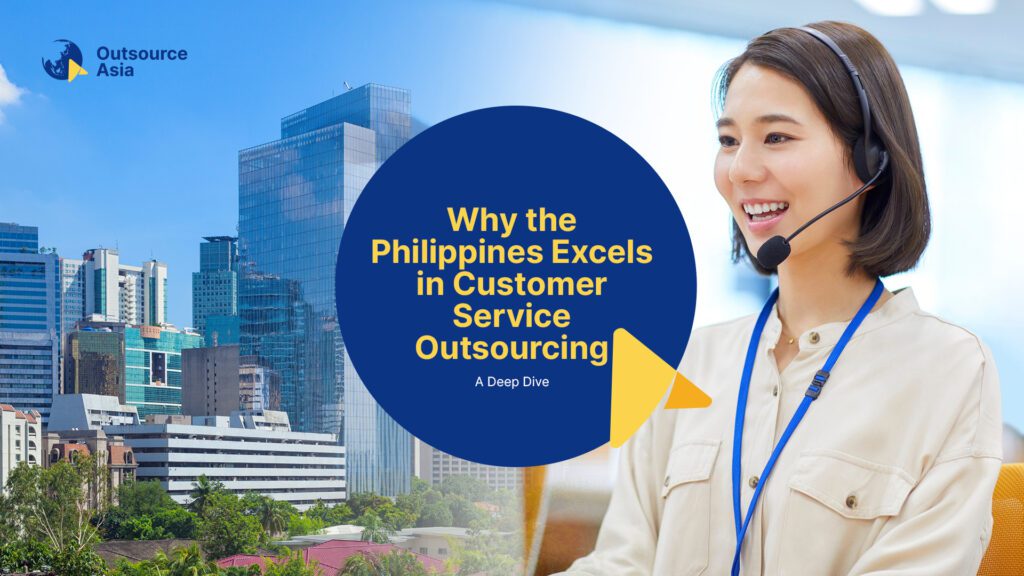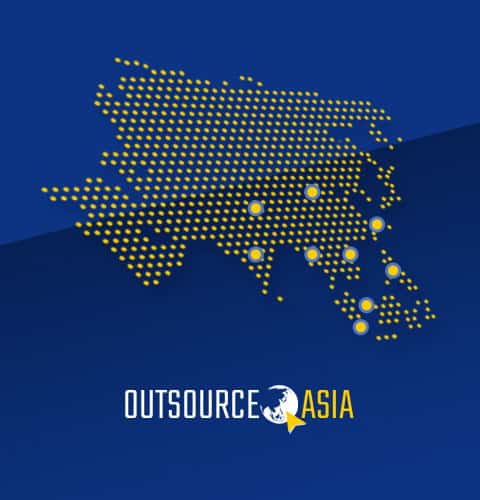Outsourcing isn’t what it used to be. It’s no longer just about saving money; it’s about transforming the customer experience (CX). For companies that treat CX as a growth strategy instead of a cost center, the rewards are striking — they grow revenue up to 80% faster than competitors that don’t, according to McKinsey & Company.
That shift has changed how businesses choose their partners. They don’t just want cheaper labor; they want high-touch, high-empathy service that protects brand reputation. And that’s exactly why the Philippines sits at the top of the global customer experience outsourcing game.
The Philippines’ Rise as a CX Powerhouse
The Philippines has carved out a unique niche in Customer Experience Outsourcing (CXO), which now makes up more than half of its entire BPO industry. The numbers tell the story: the sector is on track to hit US$37.87–40 billion in 2024, roughly 9% of the country’s GDP, growing at a steady 7% annually, according to BusinessWorld Online and The Philippine Star.
That’s more than double the global BPO average. The momentum is driven largely by North American and Australian clients who trust the Philippines for customer-facing work, the kind that requires empathy, problem-solving, and a human touch.
While India still leads in IT and knowledge processes, the Philippines owns the “people” side of outsourcing. It’s not just bigger; it’s better at what matters most in CX: connection, clarity, and care.
Communication That Builds Trust
In customer service, clarity is everything. The Philippines has a linguistic advantage that few countries can match.
English is a core part of education and daily communication. According to the 2024 English Proficiency Index, the country ranks 22nd globally and 2nd in Asia, with a score of 570, well above the global average. But beyond fluency, it’s the neutral accent that seals the deal.
Clients across the U.S. and Australia consistently note that Filipino agents sound natural, clear, and easy to understand. That’s not a soft skill—it’s a commercial advantage. Some analysts estimate that India loses up to 70% of new voice contracts to the Philippines because of accent comprehension issues.
When customers don’t have to strain to understand an agent, everything improves—call times drop, satisfaction rises, and loyalty grows.
The Empathy Edge
The Philippines also has something you can’t train easily: empathy.
Customer service isn’t just about solving problems; it’s about how those problems get solved. Filipino agents are known for their patience, warmth, and sincerity—traits that stem naturally from local culture. It’s often called the “hospitality gene,” and in a contact center, it shows.
They don’t just follow a script; they connect. They listen. They defuse tension with humor and grace. It’s no coincidence that many clients describe Filipino agents as having a “human warmth” that’s hard to replicate elsewhere.
Research backs it up. Studies show that high emotional intelligence among Filipino contact center professionals directly correlates with better performance and higher customer satisfaction. For global brands, that translates into fewer escalations and stronger customer loyalty.
A Deep, Skilled Talent Pool
Sustainability is another reason the Philippines stays ahead. Every year, the country adds roughly 350,000 college graduates to its labor force. With a median age of 25.7, the workforce is young, tech-literate, and eager.
The Technical Education and Skills Development Authority (TESDA) helps maintain professional standards through training programs like Contact Center Services NC II, ensuring new entrants have strong communication and service fundamentals.
And the industry is maturing fast. Attrition, which once hovered around 70%, has fallen to under 20% as companies focus more on employee well-being and career growth. That means clients get consistency from experienced teams who stay and grow with the brand.
Cost Efficiency Meets Policy Stability
Yes, outsourcing to the Philippines saves money, often 30–80% compared to hiring locally in the U.S. or Australia. But it’s not just about savings; it’s about predictability.
Government support through the Philippine Economic Zone Authority (PEZA) gives BPO companies long-term tax incentives, VAT exemptions, and operational perks that make it one of the most stable outsourcing environments in Asia. This structure gives global investors’ confidence that their multi-year CX strategies won’t be upended by policy shifts.
Built for Scale and Resilience
The industry’s infrastructure has also grown. Metro Manila remains the core, but other cities like Cebu, Davao, Iloilo, Clark, and Cagayan de Oro have become thriving secondary hubs. This spreads opportunity, reduces congestion, and strengthens business continuity.
Top firms also invest heavily in redundancy in backup power, disaster recovery systems, and data security, ensuring 24/7 uptime. They’re blending that resilience with smart tech. AI and analytics now support human agents rather than replace them, giving teams more context and agility in every interaction.
Standing Tall Among Global Competitors
Stack the Philippines up against other outsourcing giants, and its CX edge becomes clear:
|
Factor |
Philippines |
India |
South Africa |
|
Primary Strength |
Voice BPO, CX Management |
IT, Software, KPO |
CX, HR, Recruitment |
|
Cultural Fit (West) |
Strong |
Moderate |
Strong |
|
Accent Clarity |
High Neutrality |
Needs Improvement |
High |
|
Market Size (2024) |
~$40B |
~$200B |
Growing |
For voice-based, relationship-driven work, the Philippines wins on clarity, empathy, and consistency. It’s not about replacing India or South Africa, it’s about specialization. Each country has its niche, and the Philippines has mastered the one that defines brand loyalty.
Results That Speak for Themselves
The payoff is tangible. Many companies report up to 50% savings after moving operations to the Philippines but the real impact shows in customer metrics.
A U.S. telecom giant cut wait times and boosted satisfaction after shifting to a Philippine contact center. An e-commerce platform improved service ratings by 40%. These aren’t isolated wins; they’re the norm.
The Human Advantage in an Automated World
AI is transforming service delivery, but it can’t replace emotional intelligence. As bots take over routine queries, human empathy becomes more valuable than ever. That’s the Philippines’ long-term advantage.
Filipino agents know how to read tone, sense frustration, and turn friction into trust. That’s the kind of nuance machines still can’t match, and it’s what keeps global brands coming back.
The Bottom Line
The Philippines leads the world in customer service outsourcing because it delivers more than efficiency, it delivers connection.
It combines language fluency, cultural empathy, professional training, and policy stability into a full-service ecosystem that supports real CX transformation. For global enterprises aiming to deepen customer relationships and elevate service quality, the Philippines isn’t just a smart outsourcing destination.
It’s the partner you want when the customer’s experience truly matters.
Outsource Asia can connect you with experienced, specialized VAs who fit your exact needs. Let us help you build a team that makes your business better every day.
Contact us today to get started.


